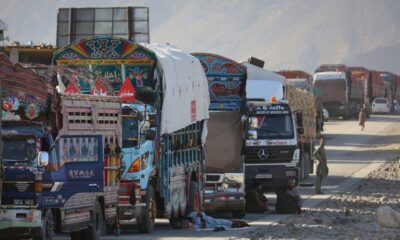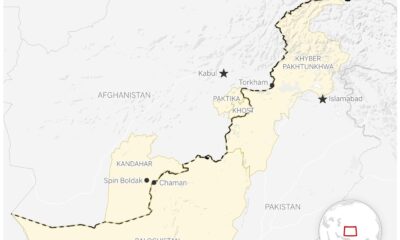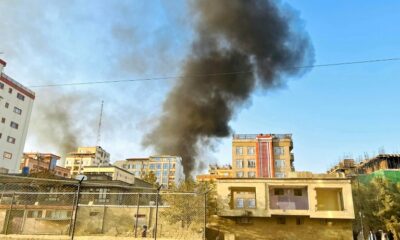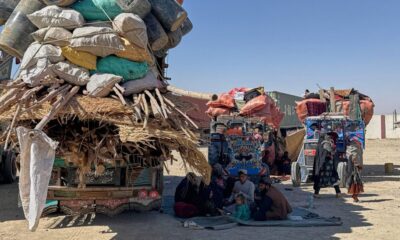Top Stories
Urgent Crisis: Indus Delta Faces Devastating Destruction Now
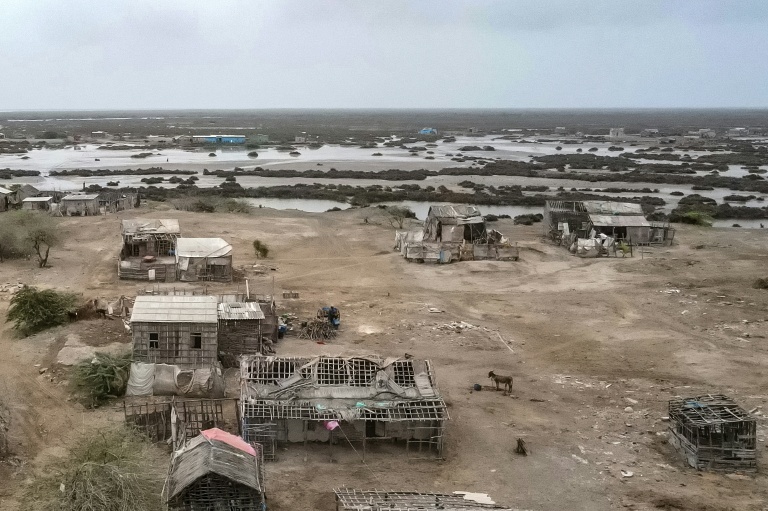
UPDATE: The Indus Delta in Pakistan is rapidly deteriorating, with severe seawater intrusion forcing communities to abandon their homes. Residents like Habibullah Khatti are facing an urgent crisis, as they prepare to leave their parched island village of Abdullah Mirbahar due to collapsing farming and fishing industries.
The Indus River, which once nourished this region, has seen a staggering 80 percent decrease in water flow since the 1950s, primarily due to irrigation canals and climate change. As saline water engulfs the delta, the local population has plummeted from 26,000 in 1981 to 11,000 in 2023, leading to the displacement of over 1.2 million people in just the last two decades, according to the Jinnah Institute.
Khatti laments, “The saline water has surrounded us from all four sides,” underscoring the desperation felt by many. The once-bustling town of Kharo Chan has dwindled to just a few households, with most of the original 40 villages now submerged. A haunting silence fills the area as residents abandon their homes, with stray dogs roaming through deserted structures.
In nearby Keti Bandar, the ground is blanketed with a white layer of salt, a dire testament to the encroaching seawater. Traditional livelihoods have been obliterated, as the salinity of the water has risen by approximately 70 percent since 1990, rendering agriculture impossible and drastically affecting local fisheries.
Local activist Fatima Majeed from the Pakistan Fisherfolk Forum highlights the human impact of this crisis. “We haven’t just lost our land, we’ve lost our culture,” she states, reflecting the deep emotional toll on families forced to migrate. Women, who traditionally contributed to fishing and net-making, struggle to adapt to urban life in cities like Karachi.
To combat this environmental disaster, the Pakistani government, in collaboration with the United Nations, launched the Living Indus Initiative in 2021, aimed at restoring the delta and addressing soil salinity. However, efforts face challenges, including land grabbing and residential developments that threaten the remaining mangroves, which serve as crucial barriers against saltwater intrusion.
The situation is exacerbated by geopolitical tensions with neighboring India, which has threatened to build dams upstream and revoke water-sharing treaties, further jeopardizing the delta’s water supply.
As Khatti and countless others prepare to leave their homeland for the bustling streets of Karachi, the urgency of the Indus Delta crisis cannot be overstated. This disaster is not only a loss of land but a heartbreaking farewell to a way of life that has sustained generations.
With communities in turmoil and the environment in decline, immediate action is essential to prevent further devastation. The world must watch closely, as the plight of the Indus Delta reflects broader challenges posed by climate change and resource management in vulnerable regions worldwide.
-

 Politics4 weeks ago
Politics4 weeks agoSecwepemc First Nation Seeks Aboriginal Title Over Kamloops Area
-

 World5 months ago
World5 months agoScientists Unearth Ancient Antarctic Ice to Unlock Climate Secrets
-

 Entertainment5 months ago
Entertainment5 months agoTrump and McCormick to Announce $70 Billion Energy Investments
-

 Science5 months ago
Science5 months agoFour Astronauts Return to Earth After International Space Station Mission
-

 Lifestyle5 months ago
Lifestyle5 months agoTransLink Launches Food Truck Program to Boost Revenue in Vancouver
-

 Technology3 months ago
Technology3 months agoApple Notes Enhances Functionality with Markdown Support in macOS 26
-

 Lifestyle3 months ago
Lifestyle3 months agoManitoba’s Burger Champion Shines Again Amid Dining Innovations
-

 Top Stories2 months ago
Top Stories2 months agoUrgent Update: Fatal Crash on Highway 99 Claims Life of Pitt Meadows Man
-

 Politics4 months ago
Politics4 months agoUkrainian Tennis Star Elina Svitolina Faces Death Threats Online
-

 Sports5 months ago
Sports5 months agoSearch Underway for Missing Hunter Amid Hokkaido Bear Emergency
-

 Politics5 months ago
Politics5 months agoCarney Engages First Nations Leaders at Development Law Summit
-

 Technology5 months ago
Technology5 months agoFrosthaven Launches Early Access on July 31, 2025



